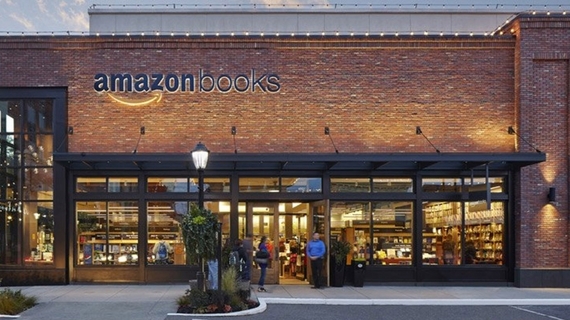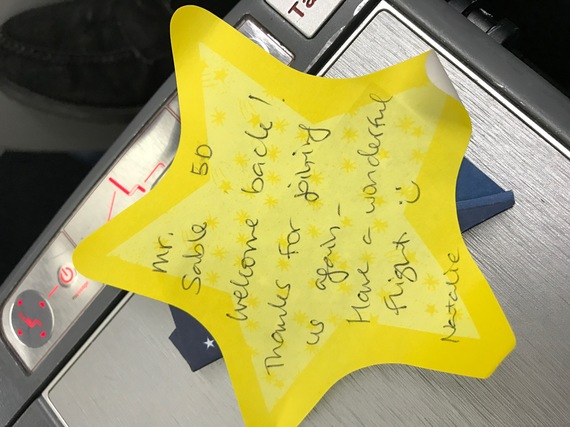Amazon is opening a book store at The Shops at Columbus Circle, right across from my office. I see the banner from our windows every day and I smile. Jeff Bezos gets it, he understands the time is ripe...but more on that later.
Warby Parker continues to build out its physical presence, as does Bonobos. I don't know about you, but I love walking neighborhood streets and looking for new, well-curated and displayed retail offerings from the new class of artisanal entrepreneurs who know and embrace the notion that digital is everything, but not everything is digital.
Frankly, my mantra is in fact a critical distinction and a powerful competitive edge because it suggests and leverages the notion that it's not one or the other, it's not one over the other, in fact, it's about neither. The competitive edge, the distinctive differentiation, is to understand that technology is an enabler and when paired with the right application (not "apps"), it actually enables people to do things better, more efficiently and with better outcomes for all.
Case in point: Last night I flew to Europe on a Delta flight. All of my interactions with Delta were remote and digitally driven, via emails, messaging and web interaction...until I sat on the plane and a cabin attendant came over to thank me for being a mega Delta flyer, handing me a little note and an origami "private plane" of my own. You tell me?
Here is another: I was visiting my friend at VML, Kansas City, and he took me to a little store called Baldwin that makes great denim and other casual stuff. I bought a pair of jeans and loved them so much I bought another pair online. Then I discovered you could find them at a few select New York shops. Next, Baldwin offered sweaters, online, on sale after the holiday. I bought one and soon discovered that they're opening a boutique pop-up in New York City--my wife says because I bought so much.
My point is that I never would have bought that first pair of jeans unseen, untested, untried, but once I did, Amex away...
Bottom line, the trend in retail is clear. The serious players understand that the digibabblists need to go away. Retail is about people and profits. Finding the right balance of engagement, excitement and relationship drives people to buy, and playing the right channels benefits the seller.
However, there remains a lot to learn. Maybe the most, in fact, from the hardware and software developers and manufacturers, the service providers and of course from people.
Amazon, Google, Apple, Netflix, Snapchat and Facebook have all begun to blur the lines between physical and digital, hardware and software, service and content--much like the retailers have been street and screen, brick and mortar, and click and flick.
Alexa turns our lights on and off, updates me with the latest local, regional and global news every morning and provides the time and weather as I prepare to head out. She also manages my music and, as we have distributed various Echo Dots around the apartment, makes it all as easy as asking.
Honestly, I don't yet use Alexa to make purchases and I'm dreading adverts or a premium price subscription to avoid hearing them...and this is coming from an ad guy. But I can see myself asking Alexa to reserve a book at the new Amazon store opening across the street, and I can see myself going there to pick it up...and they know, and I know, that I will probably buy another one at the store, which I wouldn't online...serendipity?
Apple, as I have written about many times, is genius with a phone, a watch, a pad, a TV, with music and more. They don't suffer the same self-conscious digibabble need to call basic things and services by made-up names that somehow seem digital or leading edge. And now it looks like they might actually move into serious original video content. Given their people focus, they will be good at it.
Google, we know, is an advertising super-juggernaut looking to own every possible outlet for what? More advertising. Pundits take note.
Snapchat? Have you tried their Spectacles? It's a fun product but just a gimmick for now. Wait till they go public--they have pivoted, successfully so many times. Who knows, maybe they'll buy Nikon or Cannon. One thing is for sure, the folks who were never going to sell advertising or keep their content alive have moved on impressively and in my view will continue to do so. Don't be surprised!
Facebook continues to grow but hasn't figured out, yet, how to integrate hardware, and pushing for more user-generated content is old and rather basic. We're in the golden age here--amazing productions, fabulous scripts, wonderful acting. The real money and audience loyalty can be found in great, not in cute.
All of which brings me back to Amazon and their continued application of brilliant and focused insight. "People first," if you like.
Amazon has a movie with an Oscar nomination Manchester by the Sea. It's one of the more talked about movies of the season with a decent gross from its theatrical release--almost $40 million so far and growing. After the Oscars, the film will no doubt continue to deliver and will eventually hit Pay-For-View and Amazon Prime streaming.
Why is this critical? Because Netflix has tried to break out of the TV-like episodic binge-watching mode they're in (and do brilliantly by the way--I'm addicted) and into the word-of-mouth single production world that drives so much interest and passion.
Beasts of No Nation, in 2015, was their big entry and it was a poor one, garnering only $90,000 in theaters. Now, to be fair, most theaters would not show the film, since Netflix still insists on the "new world" model of theatrical and streaming at the same time.
As reported by The Atlantic:
Unlike Amazon, Netflix insists on releasing its films in theaters and online simultaneously, rather than prioritizing the theater experience. Though the company claimed 3 million people watched Beasts online in its first week, Netflix doesn't make its ratings data public, so that claim was hard to parse--especially how many viewers sat through the entire film.
And:
Unlike Netflix, Amazon has quickly built up a reputation in terms of prestige because it gives its films actual theatrical runs, rather than treating the cinema experience as an afterthought.... In each case, Amazon partnered with a theatrical distributor to release the films nationwide before premiering them on Amazon Prime a few months later, where they can be streamed for free by subscribers.
So there you have it...digibabble vs people first. Actual human insight vs. algorithmic analytics.
Do the math yourself. Amazon wins hands down.
And I'd argue strongly, as I always do this Super Bowl time of year, that advertisers should look to the Amazon model. What does it mean to pre-release your commercials? it means you already released them. They ran. We've seen them. Why have you allowed yourselves to be bullied into losing the buildup and theatrics of it all?
Play the game as it should be played. Build up. Tease. Engage. The best have been doing so for as long as I can remember...see Joe Namath and his Fu Manchu mustache. But also learn from Amazon--think of the experience that drives the most passion, not meaningless sharing.
So there you have it.
Amazon opens stores, releases movies in planned stages and turns your lights on and off.
Seems to me there is a lot to learn here, starting with a "people first" approach to a "digital is everything, but not everything is digital" approach.
Or you can join the chorus of pundits and pretend that retail means web only, movies mean streaming only and that algorithms tell it all...listen:
"The purpose of computing is insight not numbers" -R.W. Hamming
As Amazon continues to prove...
What do you think?
Read more at The Weekly Ramble
Follow David Sable on Twitter: www.twitter.com/DavidSable


